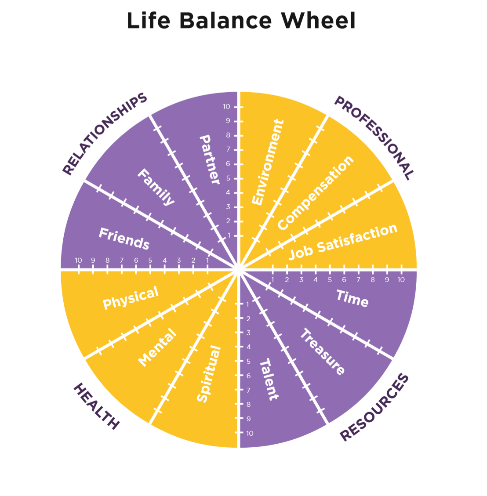Blog #269
Most people allow others to control the narrative of what success looks like. In Blog #268 (True Success Begins With a Holistic Assessment), I discussed how this can change. In order for senior leaders to truly meet their maximum potential, they need to be well-rounded individuals who are able to define success on their terms. This is not to say that work life and compensation are not important; they are critical! However, the way you choose to look at success can impact how you define and achieve it.
In this post, we are going to explore two quadrants of The Life Balance Wheel: Professional and Resources.
- Professional
- Environment
- Compensation
- Job Satisfaction
- Resources
- Time
- Treasure (Money and Stuff)
- Talent (Skills)
Pieces of these two areas are the primary metrics that people use to gauge their success, such as titles, salary bonuses, and occasionally, vacation time. While these are important, they are not necessarily the end-all, be-all. I witnessed many instances where a senior leader makes great money and has an impressive title, but they don’t really like their work environment. Or perhaps they felt like they completely lost control of their time. In other cases, someone may love what they do, but work in an environment that is hostile, intolerable, intimidating, stressful, or oppressive.
If you are not happy at work – for whatever reason – you need to own that. You are the one who is accountable for the situation you are in. The great news is you are also the one who can improve that situation in order to achieve your dreams.
When working individually with clients during the assessment phase, we explore the three sections of each quadrant and discuss what it would take for particular items to score a ‘10’. I prompt them to visualize the future by asking what great would look like 12 months from now. We then begin to document each point into a comprehensive list of opportunities to be addressed, as well as challenges to overcome.
- Professional
- Environment
- What does your ideal office look like?
- How far from home is your office located?
- Do you socialize with people from work?
- Compensation
- Do you feel you are paid what you are worth?
- Do you have the time and benefits you feel you deserve?
- Do you have the opportunities for growth you are looking for?
- Job Satisfaction
- Do you enjoy what you do?
- Do others appreciate the work you do?
- Are you making the impact on the world that you want to?
- Environment
- Resources
- Time
- Do you control your time or are you constantly reacting?
- Do you have the time to spend on yourself and your family the way you want?
- Do you take as much vacation as you would like?
- Treasure (Money and Stuff)
- Do you have all the “stuff” you want?
- Do you feel comfortable with where you are financially and with what you have in savings?
- Do you worry about money or the financial future?
- Talent (Skills)
- Do you feel you are maximizing your skills and talents?
- Are you comfortable with the investment you make towards improving yourself?
- Do you feel like you are growing or do you feel stuck?
- Time
The next step is to go through all the questions and ask what it will take to get each item to a 10 (if they are not there already). The point of this process is to analyze these things that can have a huge impact on how successful you feel in your workplace and in your current position.
When working with leaders and writing out their lists, my mind starts churning as I look for trends and recurring themes. I often see time management or proactive planning rise to the top of the list.
In next week’s blog, we will continue working through the quadrants to explore how right-brained thinking affects our assessment of our relationships and health.
Are you a leader who is interested in learning how to define success on your terms? Do you want to maximize your and your organization’s success metrics? We can help with that! Contact us today to get started.
Keep Smiling,
Kris


